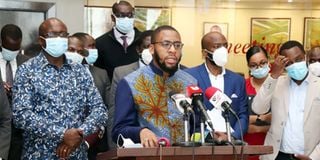Premium
Country faces full blown health crisis as doctors’ strike begins

Kenya Medical Practitioners, Pharmacists and Dentists Union acting Secretary-General Chibanzi Mwachonda (centre) addresses journalists in Nairobi.
What you need to know:
- With no one to attend to a majority of Kenyans, the outcome is too dire to contemplate.
- There were 852 Covid-19 patients admitted to hospital, with 86 in intensive care, as of yesterday.
The crisis at public hospitals is expected to grow worse as doctors join nurses and clinical officers in boycotting work.
For two weeks, public hospitals have been manned by doctors after the other healthcare employees went on strike.
The new crisis comes at critical time – the festive season when coronavirus infections are expected to rise rapidly.
With no one to attend to a majority of Kenyans, the outcome is too dire to contemplate.
There were 852 Covid-19 patients admitted to hospital, with 86 in intensive care, as of yesterday.
The health workers are demanding an increase in risk allowances, sufficient personal protective equipment (PPE), a comprehensive medical cover, implementation of collective bargaining agreements and promotions.
They also want their elderly colleagues excluded from Covid-19 frontline duties.
Negotiations
In a statement released yesterday, Kenya Medical Practitioners, Pharmacists and Dentists Union (KMPDU) acting Secretary-General Chibanzi Mwachonda said the workers’ strike begins at midnight.
The doctors added that the issues they have been raising have not been addressed despite eight months of negotiations.
“We wish to inform the public that we will withdraw our labour in accordance with Article 41 of the Kenyan Constitution due to unresolved issues,” the union said.
The doctors had given a 21-day strike notice, which elapsed on December 6, but suspended the work boycott for 14 more days.
Pharmacists, medical officers, dentists, specialists, medical superintendents, country directors of health, doctor administrators, sub-county medical officers and interns are expected to take part in the strike.
“We have been very lenient. The union suspended the strike to give room for discussions but these have not been fruitful. The strike begins on Monday. The government should stop taking us for granted,” Dr Mwachonda told the Sunday Nation.
He added that the country has a serious shortage of doctors and other health workers.
Demotivated workers
“The workforce is strained. The government must recruit more health workers since the burnout cannot be merely wished away. This is one of the reasons the doctors are going on strike,” Dr Mwachonda said.
“The workers are wounded, demotivated and feel abandoned by their employer.”
Dr Mwachonda added that doctors have been left to their own devices as they struggle with substandard PPE and no life insurance and allowances.
“How do you fight a war when the number of your soldiers is falling? We must be protected,” he said.
About 2,900 health care workers have tested positive for coronavirus, out of which 1,177 are male.
Thirty two have died from the disease, according to the Ministry of Health.
The frequent strikes by health workers have largely been caused by a leadership gap and mechanisms for dispute resolution and prevention at the county government level.
Most health services were decentralised when the country adopted the new Constitution in 2013.
The reasoning was that devolving health would ensure ordinary Kenyans access the services easily.
It was not to be. Health care workers’ unions and the two levels of government are rarely on talking terms, with most disputes ending up in court.
National and county government officials have also turned to threatening frontline workers with dismissal if they fail to obey court orders criminalising the strikes.
Advisory council
On Friday, High Court judge Nzioki wa Makau granted the ministry orders suspending the strike for 14 days to give room for negotiations.
The case will be mentioned on December 31.
“It is ordered that a temporary relief be issued for 14 days to allow negotiations before the virtual mentioning of the case,” the judge said.
However, the striking workers insist that they will not report to duty until their demands are met.
The unions have told county governments not to intimidate the health workers.
Kenya Union of Clinical Officers Secretary-General George Gibore said his members would not be threatened into submission.
“Only the advisory council of the union can call off the strike,” he said.





